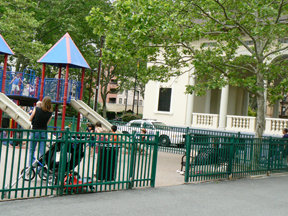It is almost unavoidable at this point; county taxes are going up. But for Hoboken, it’s worse.
Because of a state formula used to calculate how county taxes are charged to municipalities, Hoboken would be hit very hard whether the county raised taxes or not.
The county’s Board of Chosen Freeholders will vote on the county budget in June. The budget covers spending from Jan. 1, 2010 to Dec. 31, 2010 and contains a $12 million increase over 2009 to the tax levy, the amount to be collected from county residents to support regional services.
Hoboken’s share of county taxes is likely to increase between $5.5 and 5.8 million over 2009, but only about $2 million of that hike comes from the increased county levy.
“They need to go back to the drawing board.” – Dawn Zimmer
________
Hoboken paid nearly $40 million to the county in 2009, over 15 percent of the total tax levy for just one of 12 municipalities, according to city spokesman Juan Melli.
In 2010, the city will contribute almost 17 percent, he said.
Several county and local officials explained to the Reporter why Hoboken is taking the biggest tax hit in the county, and what can be done about it.
Penalizing success
“Hoboken is a victim of its own success,” said Kennelly. “The growth in Hoboken is so unbelievable compared to other municipalities [in Hudson County], even Jersey City.”
The state uses a “convoluted formula,” according to Hudson County Tax Assessor Donald Kenny, to determine what portion of county taxes each municipality is responsible for, using “equalized property value.” That formula subjects the total assessed value of all properties in town to a conversion ratio that raises the total to near market value. A city like Hoboken, whose property values have held steady in the recession compared to other towns, thus gets hit with a much larger share of the county tax levy.
“We’re being penalized for retaining the value [of our properties],” Mayor Dawn Zimmer said last week.
Many other towns are experiencing drastic decreases in property values, but Hoboken is an “anomaly,” Kennelly said, with stable or rising property values for the city as a whole.
“It’s a whole different universe in Hoboken,” Kennelly said, calling the mile-square city a figurative “suburb” in Hudson County.
County services
Many residents do not even know what the county does for them, or if it’s enough to justify the large tax burden.
The county operates the Sherriff’s Office, county jail, prisoner transport, juvenile detention, superior courts, welfare administration, parks, senior services, and – most recently in Hoboken – road paving.
“In Hoboken,” Kennelly said, “there isn’t a lot of need for [some of] those services. That’s why there’s a tremendous outrage.”
Kennelly said that even if Hobokenites do not directly reap the rewards of some of these services, they benefit by proxy in such a densely-populated county. “Hoboken isn’t an island,” he said.
He said the county recognizes the large contribution that Hoboken makes while only representing 6 percent of the county’s 600,000-plus total population. Officials are trying to find other ways to help the residents, like contributing money from the county’s Open Space Trust Fund to help fund local parks in Hoboken.
The county already owns and operates Columbus Park, Ninth and Clinton streets, and just completed renovations to the grounds.
They have recently dedicated money for parklands that Zimmer said the city needs to “move on” before the funding disappears, like funding for 1600 Park Ave.
Freeholder Anthony Romano, who represents Hoboken and part of Jersey City, said he has been working with the county to get more support for shared services like automotive repair.
Budget fixes?
Since half of the budget year is nearly over, the Freeholders will have a tough time realizing savings this year.
Kennelly said the county had “staggering losses” in revenue this year, especially in their registrar’s office, due to the collapse of the housing market, Kennelly said.
One potential solution to the spiking tax levy would be to use funds collected from the county’s Open Space Trust Fund, a referendum-approved regional “one cent” tax dedicated to creating more open space and parks in the county.
The estimated $7 million to be collected for open space would be used to reduce the $12 million levy hike.
Romano said, “It’s a temporary measure that doesn’t help solve our problems in the long run. It’s not a popular idea.”
Jersey City Freeholder Bill O’Dea said he is considering the option. “Any decisions we make are not fun and popular ones,” O’Dea said. He said Hoboken, as a city, doesn’t get back what it pays into the trust fund every year; so in a year where they are feeling the heat the most, using this money may help.
“It’s a one-shot gimmick,” said Zimmer. “They need to go back to the drawing board.”
Change the formula
O’Dea said he proposed a resolution years ago at the county to ask the state to change their formula.
“There’s got to be a better method,” he said. His proposal would have set a base year reflecting current levy distribution, and a more fair distribution of increases going forward.
“I would be supportive [of a change],” Zimmer said, depending on what the particulars are.
“Every year there’s a winner and a loser,” Kenny said. “Every year the loser wants to change the system.”
Timothy J. Carroll may be reached at tcarroll@hudsonreporter.com.
